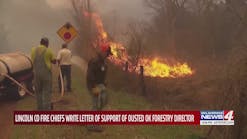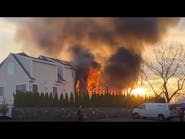They suddenly perk up.
"Mr. Peluso, are you going to go?" a few ask, giddily.
Patrizio Peluso assures the Cliffside Park High School students he won't be stepping out. Not this time.
Peluso's pager, clipped to his belt in the daytime or on his nightstand while he sleeps, ties him to a treacherous job that rouses him from bed, forces him to cancel engagements abruptly and yanks him from movie theaters way before the closing credits begin to roll.
All for a job he basically does without pay.
A teacher by trade, Peluso is one of thousands of men and women across New Jersey who donate countless hours to their communities - not by picking up litter or feeding the homeless but by charging into houses that are being swallowed by raging flames.
Unlike career firefighters, who put their lives at risk day by day and are compensated with a steady paycheck, these brave souls battle house fires and rescue car crash victims for little or no money.
Because of high overhead costs and personnel expenses, suburban towns usually forgo hiring full-timers and rely on volunteers with fire-rescue training to do the job. Starting and maintaining a fire department costs millions of dollars a year, money that many cash-strapped municipalities prefer to spend elsewhere.
In New Jersey, the vast majority of firefighting is handled by legions of unpaid workers, with about 88 percent of fire departments mostly run by volunteers, according to the National Fire Department Census Database compiled by the United States Fire Administration. The state's numbers closely mirror the national figure - 87 percent.
In Bergen County, there are only four paid departments: Hackensack, Englewood, Teaneck and Ridgewood. Edgewater's is the only fire department in Bergen County that combines career firefighters with volunteers. Passaic County's only paid departments are those in the cities of Passaic, Clifton and Paterson.
Accountants, government employees, police officers and hardware store owners are among the thousands of volunteers in New Jersey who rush from their jobs to firehouses and change out of their business suits or uniforms, slip into bunker gear, and mentally prepare themselves to forget about tax returns or traffic tickets and concentrate on saving lives.
They miss birthday parties, New Year's eve bashes and Fourth of July picnics to fulfill a duty that compensates them with gratitude and smiling faces - not to mention the thrill, the rush, the danger.
"You never know when something is going to happen, or when you're pager is going to go off," said Peluso, a volunteer firefighter for Fort Lee, who, like many volunteers, followed in his father's footsteps after graduating from Lodi's Felician College in 2002. "I love it."
Peluso responds to one to three calls a day, sometimes as many as seven. He says he's lucky to have a good "support system" of people who don't mind when he abruptly has to run out. The principal of Cliffside Park High School, for example, found a substitute to cover Peluso's class after he had to rush to an early afternoon blaze at the Horizon House apartments in February.
His girlfriend also is understanding, Peluso said. A few weeks ago, while they were dining at the Big Red Tomato restaurant, his pager went off minutes after they ordered their meals. Someone had reported thick black smoke billowing out of a house.
"I looked up at her and asked: 'Do you mind if I go?" Peluso said.
After walking him to a fire station two blocks away, she waited until he returned. The call turned out to be charred food.
Peluso's own food didn't overcook: The restaurant kept it warm until he and his girlfriend returned more than an hour later.
Some volunteers, like Wayne Fire Commissioner Michael Lorusso, are living a childhood dream that took shape when they saw their first firetruck.
"If anything, it does infringe upon your personal life," said Lorusso, who by day is an accountant. "But we do it because we enjoy it."
Lorusso has been a volunteer firefighter since 1980, when he was a senior in college. He owned his own accounting practice for about 15 years, which gave him flexibility to leave when necessary. But it was still difficult to balance the two, especially when he became fire commissioner and firefighting became a full-time job.
"I'm very selective," Lorusso said. "It has to be something serious for me to take the day off from work or to reschedule appointments. But when I do go out to a call, I make up the time by going back to work after it's over and working late."
His busiest time as an accountant - the weeks leading up to April 15 - leave him so swamped he cannot answer calls.
"During that time, they usually know they won't see me very much for a couple of weeks," |he said.
Having volunteers allows fire departments to mobilize dozens of firefighters quickly for a lot less money. But some see drawbacks.
Proponents of career departments say paid firefighters offer better protection because they are outfitted and in the station when the call comes, and they have more experience.
"Historically, the benefit of career departments has been that we have a better response time because we are in the firehouse and don't have to be summoned from home or work," said Hackensack fire Capt. Thomas Canzanella, president of the Professional Firefighters Association of New Jersey.
Canzanella said a swelling population in New Jersey and more stringent regulations since the Sept. 11 terrorist attacks have made it difficult for volunteer departments to keep pace with the increased workload, especially in the state's southern end. Career departments themselves are struggling to meet the new demands and purchase all the necessary equipment, he said.
"It's even difficult for us to keep up," Canzanella said. "I don't know how volunteers do it."
Of 111 firefighter deaths nationwide last year, 81 percent were volunteers, federal statistics show. Over the past decade, career firefighters have been involved in a third of the fatalities.
A recent study of firefighter fatalities by the U.S. Fire Administration shows that although the number of volunteer deaths is higher, career firefighters deaths are more frequent. The report, which studied firefighter deaths from 1990 to 2000, suggests that the reason for the disparity could be that career firefighters respond to a higher number of fires than volunteers do, and they protect a greater swath of the country's population - 59 percent versus 41 percent.
On his first mission as a volunteer, Fort Lee fire Lt. Christopher Radoian was rushing up the stairs to the 12th floor of a blazing high-rise when the hot breath of the fire shifted in his direction. The heat became unbearable and he froze. His colleagues had to rescue him by dragging him out by his collar, he said.
Did that experience discourage him at all?
"No way," said Radoian. "I wanted to be a firefighter even more."
To lure more volunteers, some departments pay small stipends or kick in money for retirement funds or tuition programs. Leonia, for example, pays $175 a month to its volunteers and Fort Lee $550 a month. Firefighters who have volunteered for more than seven years and have responded to 60 percent of fire calls can be eligible for $5,000 for burial costs. Those who have been firefighters for more than a year are eligible to retire at the New Jersey Firemen's Home in Boonton.
But it is more than the skimpy benefits that drive firefighters to give up family time and their social lives, and endure the mandatory 138 hours of fire-rescue training.
"When you are a career firefighter, it's just a job. You complain about the house and the work," said River Edge Fire Chief Richard Curran, who doubles as a borough police sergeant. "Volunteers are there because they want to be there. You do it because you want to give back to the community."





